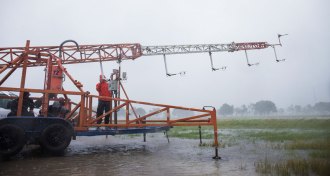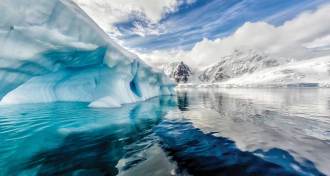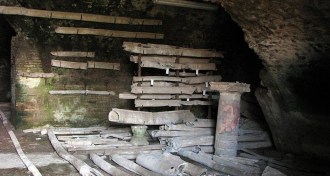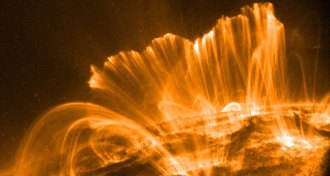Earth
Sign up for our newsletter
We summarize the week's scientific breakthroughs every Thursday.
-
 Agriculture
Agriculture‘Big Chicken’ chronicles the public health dangers of using antibiotics in farming
A new book takes a hard look at the chicken industry for its role in fostering antibiotic resistance.
-
 Earth
EarthHow hurricanes and other devastating disasters spur scientific research
Hurricanes such as Harvey, Irma and others have been devastating, even deadly, yet they drive our desire for scientific discovery.
-
 Environment
EnvironmentAir pollution takes a toll on solar energy
Dust and other tiny air pollutants can reduce solar energy output by as much as 25 percent in parts of the world.
-
 Climate
ClimateRising temperatures threaten heat-tolerant aardvarks
Aardvarks may get a roundabout hit from climate change — less food.
By Susan Milius -
 Earth
EarthNorth America’s largest recorded earthquake helped confirm plate tectonics
Henry Fountain’s 'The Great Quake' mixes drama and science to tell the story of the 1964 Alaska earthquake.
-
 Oceans
OceansHow deep water surfaces around Antarctica
New 3-D maps trace the pathway that deep water takes to the surface of the Southern Ocean.
-
 Archaeology
ArchaeologyAncient mud documents the legacy of Rome’s lead pipes
Researchers used lead levels in Rome’s ancient harbors to track lead pipe use and urbanization.
-
 Astronomy
AstronomyOn a mountain in Wyoming, the eclipse brings wonder — and, hopefully, answers
Astronomy writer Lisa Grossman joined scientists on a mountain in Wyoming who were measuring the corona using four different instruments to try to figure out why it’s so hot.
-
 Astronomy
AstronomyDoes the corona look different when solar activity is high versus when it’s low?
Carbondale, Ill., will get two eclipses in a row, seven years apart — making it the perfect spot to watch the solar cycle in action.
-
 Astronomy
AstronomyWhy are the loops in the sun’s atmosphere so neat and tidy?
Observations during the total solar eclipse may explain why the sun’s atmosphere is so organized despite arising from a tangled magnetic field.
-
 Animals
AnimalsGiant larvaceans could be ferrying ocean plastic to the seafloor
Giant larvaceans could mistakenly capture microplastics, in addition to food, in their mucus houses and transfer them to the seafloor in their feces.
-
 Astronomy
AstronomyWhat can the eclipse tell us about the corona’s magnetic field?
The corona’s plasma jumps and dances thanks to the magnetic field, but scientists have never measured the field directly.